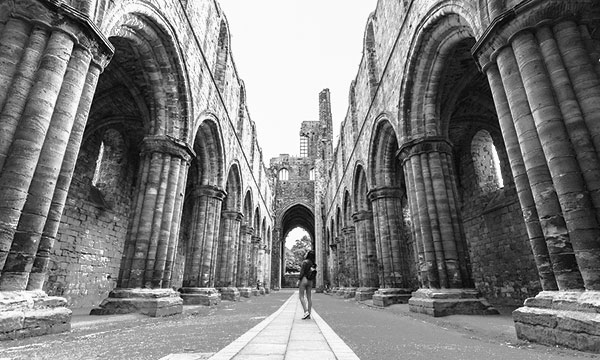
June/July
2019 - Vol. 104

|
.
The De-Christianizing
of Western Society .
by Steve Clark
This is an excerpt from
Steve Clark’s book, Building Christian
Communities: Strategy for Renewing the
Church, 1996 Edition. reprinted by Tabor
House, pages 39-44. It was first published in
1972 by Ave Maria Press, Notre Dame, and then
republished in 1992 by Word of Joy Foundation,
Inc., Quezon City, Philippines.
When society
as a whole cannot be expected to accept
Christianity, then it is necessary to form
communities within society to make Christian
life possible.
Providing Christian environments – environments
where Christianity is openly expressed and
accepted and where a person can find the
support he or she needs to be a Christian – is a
top priority and main goal of pastoral work. The
question that remains is how such environments can
be formed. Our society is not Christian. Even
within our Churches, Christian environments are
not so easy to find. What can be done?
The answer is that we need to form “Christian
communities.” A community is a type of environment
– a strong, effective form of environment. (In
chapter 3 of Building Christian Communities, the
nature of “community” will be discussed, and the
different meanings of the word will be
distinguished). In this section, community is
understood as a Christian environment.
Development of communities in
early church period
A historical perspective provides a way of seeing
more clearly the pastoral situation of the Church
today as regards to environmental forces and
community. In the first 300 years of Christian
history the Church had a very effective form of
social organization for helping Christians to live
as Christians. Those who became Christians
perceived Christianity as the most important thing
that ever happened to the human race. They readily
joined with other Christians for the purpose of
living as Christians. The communities they joined
were relatively small and tightly knit, with a
high degree of morale and social cohesion. The
result was that a person who lived in the
Christian Church in the early centuries had a
great deal of help in living as a strong
Christian. He was part of an environment (a
community) which was much stronger than any other
environment he was part of, and it provided for
him a strong support in being a Christian. Because
of their strength and vitality, these communities
attracted others to Christianity.
Formation of Christendom
beginning in the 4th century
In the course of the fourth century a major change
occurred. The Roman emperors became Christians,
and they made Christianity the state religion. The
result was a revolution in the way Christianity
was related to the environmental forces of the
time. In a relatively short period, all of society
became Christian (part of the Church).
Christianity no longer existed in strong
communities within society, but being part of
society and being Christians became the same
thing. The Church became the religious
institution for all of society and the state
became the political institution for all of
society. In other words, Christendom (a society
almost all of whose members accepted Christianity)
was formed.
Christendom brought many benefits to Christian
life. For one thing, it brought many more people
to the Christian faith and life. At the beginning
of the fourth century the Christians were a
relatively small percentage of the Roman Empire.
At the end of the fifth century, the pagans were a
relatively small percentage of the Roman Empire.
Every environment in society (with the exception
of some frontier situations where two
civilizations made contact and, for a while, some
remote rural situations) was Christian. There was
a strong force drawing people to Christianity and
keeping them Christians.
Moreover, because Christianity was the life of
society, everything in life could be Christianized
and directed toward the glory of God. The
following centuries were times in which men tried
to see all of life in a Christian way. It would be
too much to say that they succeeded perfectly. But
the results were impressive.
There was, however, at the same time a certain
price to be paid in this change. The environment
worked to make more people Christian than had been
Christian before, it is true, but it also produced
a lower overall level of Christianity among
Christians. For one thing, since everyone was a
Christian, people were not called upon to make
their Christianity a matter of personal choice the
way they had to when there were other options.
Also, because a person had to become an outcast in
society if he stopped being a Christian (since it
was a Christian society), many people were
inclined to stay Christians even though they had
no desire to live a Christian life while before
they would have just dropped out. Also, it became
harder to maintain Church discipline when the
Church was no longer a tightly knit community
within society from which someone could be easily
excluded.
Rise of Deism and skepticism in
17th - 18th centuries
In the course of the 17th and 18th centuries,
another revolution occurred in the way
Christianity was related to the environmental
forces of the time. Society began to fall away
from Christian belief. It became acceptable in
society not to believe in Christianity (it was
socially acceptable even before it was legally
acceptable). The change began among certain
thinkers in France and England who moved toward
Deism and skepticism about Christianity. By the
18th century, the Enlightenment, represented by
men like Voltaire, Diderot, Priestly and many
others, was a dominant force in Europe.
Environments began to change one by one, and as
environments changed, the faith of the Christian
people weakened. Because they had been taught to
identify “what was right” in matters of religion
with “what was accepted by society as a whole”
most people began to weaken in their Christian
conviction and their Christian living when they
saw that Christianity was not being accepted by
society as a whole they way it had been.
In the Church of the first centuries, the fact
that most men did not believe in Christianity was
not necessarily a motive for losing faith. In
fact, for many it was a strengthening motive,
because they expected that when they became
Christians, they were joining a group within
society that had something the rest of society did
not have. But since by the end of the 17th century
Christians considered themselves to be society and
not a group within society (they identified
themselves primarily as Christians), a change in
the religious convictions of Christians. Therefore
as society became less and less supportive of a
person’s being a Christian, there was a gradual
weakening of the environmental support for being a
Christian.
A variety of things happened as a result of this
change. Some environments in Western society
stayed Christian because they were out of touch
with the main currents of society (many rural
environments are still in this condition today,
although less and less so). In the United States,
ghettos were formed by immigrants who had little
social contact with the rest of the country
because of t he nationality difference (and this
trend was strengthened by the attempts of the
Church to maintain a separate school system and a
separate social system, by forbidding mixed
marriages, etc.). These ghettos stayed Catholic –
in fact, they tended to perpetuate a form of
Christendom. But in an increasing number of
situations in Western society, the environment
provided less and less support for thinking and
living as a Christian, and the result was a
weakening of Christian life.
Environmental forces against
Christianity today
Today many parts of Western society are
de-Christianized, and the trend is in that
direction. In fact, even within Church
institutions, even in environments which during
the 19th and the first half of the 20th centuries
were traditionally Christian (like Polish and
Irish neighborhoods in American cities), the
environmental forces are now against Christianity.
Since there is less and less of a natural
separation between different environments (modern
forms of communication have drawn modern society
much closer and made it much more homogeneous),
the Church can rely less and less on natural
environmental forces (rural or ghetto
conservatism, for instance, or separate schools
systems) to maintain Christian life.
There are two pastoral approaches that can be
taken in the face of the de-Christianization of
Western society. One is to try to make society as
a whole Christian (or different environments as a
whole Christian). Traditionally this has only
worked when someone or some group of people who
had control over a whole environment (the secular
rulers, usually) became Christian and were willing
to use their influence to Christianized the parts
of society they were in control of. Conceivably
making environments as a whole Christian might
also be accomplished through Christians and
Christian ideas beginning to permeate society in
different environments in society gradually, the
way technological changes or political ideas begin
to permeate society gradually. But the approach of
making society as a whole Christian does not seem
very feasible, because society as a whole is
resistant to Christianity, and therefore it seems
highly unlikely either that secular rulers would
or could make all of society Christian or that
Christianity will permeate society by natural
trends.
Returning to the pastoral
strategy of the early church period
The second pastoral approach is to form Christian
communities. This approach would mean returning to
the strategy which the early Church (and many
other religious groups throughout the centuries)
found so useful. A real Christian community
(especially in a society like our own in which
there is little sense of common purpose and
identity) would have the ability to provide an
environment in which people could live strong
Christian lives. If people can find Christian
communities which are alive, they will have the
strength as Christians to exert influence upon
society (and not simply conform to society). And
the more these Christian communities grow, the
greater the effect they will have upon society.
A "diaspora Christianity"
The main goal of pastoral action in the Church
today can be described in a variety of ways. We
need to find an alternative form of Church life to
a Christendom approach. To use a phrase which Karl
Rahner made popular: We need to form a diaspora
Christianity. We need to find a way of providing
for people an authentically Christian environment
of sufficient strength to make it possible for
them to live as vital Christians if they so
choose. We need to form real Christian
communities.
> See other
articles in
Living Bulwark by Steve
Clark
top photo: The ruins of Kirkstall
Abbey Hall in Leeds, UK being explored by a
tourist, (c) photo by Matt Latham
Bigstock.com
Photo ID: 276692632
|

|
Steve Clark has been a
founding leader, author, and teacher for the
Catholic charismatic renewal since its
inception in 1967. Steve is
past president of the Sword
of the Spirit, an
international ecumenical association of
charismatic covenant communities
worldwide. He is the founder of the Servants
of the Word, an ecumenical
international missionary brotherhood of
men living single for the Lord.
Steve
Clark has authored a number of
books, including Baptized
in the Spirit and Spiritual Gifts, Finding
New Life in the Spirit, Growing in Faith,
and Knowing God’s Will, Building
Christian Communities, Man and Woman in
Christ, The Old Testament in Light of
the New.
|
. |
|
. |
|

